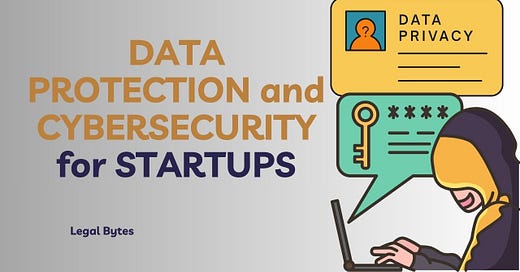DATA PROTECTION and CYBERSECURITY Strategies for Startups
Data security isn't optional for Nigerian startups, here's why and how you can safeguard your digital foundation
In today's digital economy, data is one of the most valuable assets a business owns. Whether you run a fintech platform, an e-commerce store, or a SaaS company, your startup collects and processes sensitive customer data—including personal information, financial records, and transaction details. However, without strong data protection and cybersecurity measures, your business risks legal penalties, data breaches, reputational damage, and even shutdown.
As digital businesses grow, so do the risks associated with data breaches, cyber threats, and regulatory non-compliance. Nigerian startups, particularly those handling customer data, must prioritize compliance with data protection and cybersecurity laws—not just to comply with the law but also to build trust, prevent costly security incidents, and scale sustainably.
1. Why Data Protection & Cybersecurity Matter for Nigerian Startups
Many startups underestimate the importance of data security until they experience a breach, customer complaints, or legal action. Here’s why data protection should be a top priority:
Legal Compliance: The Nigeria Data Protection Act (NDPA) and other applicable laws require businesses to protect users' data and impose penalties for violations.
Customer Trust and Brand Reputation: Users are becoming more privacy-conscious. They are more likely to engage with businesses that protect their personal information because a single data leak can destroy customer confidence.
Investor Confidence: Investors favor businesses with strong cybersecurity policies, as data breaches can damage a company’s valuation.
Operational Continuity: Startups handling financial transactions and sensitive data are prime targets for attacks. A cyberattack can disrupt operations, leading to downtime, reputational damage, and financial losses.
Global Expansion Readiness: If your startup deals with foreign customers, compliance with global data protection standards (like GDPR in Europe) is crucial. Plus compliance with these international data protection laws (e.g., GDPR) facilitates cross-border transactions and partnerships.
2. Nigerian Data Protection Laws: What Startups Must Know
The Nigeria Data Protection Act (NDPA) 2023 is the primary law regulating data protection in Nigeria. It builds on previous guidelines from the Nigeria Data Protection Regulation (NDPR) 2019 and sets strict compliance rules for businesses handling personal data. Key Compliance requirements include;
Registration & Governance: Startups processing personal data must register with the Nigerian Data Protection Commission (NDPC). They must also appoint a Data Protection Officer (DPO) if handling large-scale personal data.
Lawful Data Collection: You must have a valid legal basis for collecting and processing personal data (e.g., user consent, contract necessity, or legal obligations).
User Consent & Transparency: Businesses must obtain clear and informed consent before collecting personal data. Digital policies, like privacy policies, terms of use, etc., must be easily accessible and detail how data is collected, stored, and shared.
Data Minimization: Only collect data that is necessary for your business operations—no excessive data collection.
Data Subject Rights: Users have the right to access, modify, or delete their data upon request. They also have the right to:
Request access to their data.
Correct or delete inaccurate data.
Object to processing.
Withdraw consent at any time.
Your startup must provide a way to exercise these rights.
Data Security Measures: Businesses must implement security measures (encryption, firewalls, access controls) to prevent unauthorized access, breaches, loss, or destruction of data. Regular risk assessments and audits are necessary.
Third-Party Data Sharing Rules: If you share data with vendors (e.g., cloud storage providers, payment processors), you are responsible for ensuring they also comply with data protection laws.
Data Breach Notification: In case of a security breach, startups must report the incident to the Nigeria Data Protection Commission (NDPC) within 72 hours.
Penalty for Non-Compliance: Violating the NDPA can result in fines of up to ₦10 million or 2% of annual revenue (whichever is higher), plus possible business restrictions.
3. Cybersecurity Threats Facing Nigerian Startups
Cybersecurity in Nigeria is regulated by the Cybercrimes (Prohibition, Prevention, Etc.) Act of 2015 as amended in 2024. The Act establishes a legal framework to prevent, prohibit, detect, respond to, investigate, and punish cybercrime and other related matters. The Act also protects national information infrastructure and privacy rights.
The Cybercrime Act creates a multi-stakeholder governance framework with responsibilities distributed across several existing agencies including the Cybercrime Advisory Council, Office of the National Security Adviser (ONSA), Economic and Financial Crimes Commission (EFCC), Nigeria Police Force, National Information Technology Development Agency (NITDA), Central Bank of Nigeria (CBN), and the Nigerian Communications Commission (NCC).
Startups are common targets for cybercriminals due to weaker security infrastructures. Some of the top risks include:
Phishing Attacks – Fraudulent emails or messages trick employees into revealing sensitive data.
Ransomware – Cybercriminals encrypt business data and demand a ransom for its release.
Insider Threats – Employees or contractors misuse or leak sensitive data.
Weak Passwords & Poor Authentication – Many startups use weak credentials, making it easy for hackers to gain access.
Unsecured APIs & Third-Party Risks – Integrations with external services can introduce vulnerabilities if not properly secured.
4. Best Practices for Data Protection & Cybersecurity
To safeguard customer data and business operations, Nigerian startups should adopt these security measures:
Develop a Data Protection Policy: Clearly define how customer and employee data is collected, stored, and processed.
Encrypt Sensitive Data: Use encryption for stored and transmitted data to protect against unauthorized access.
Implement Strong Password Policies: Require multi-factor authentication (MFA) and enforce strong password rules.
Conduct Regular Security Audits: Regularly review systems to detect vulnerabilities before they become a threat.
Train Employees on Cybersecurity Awareness: Educate staff on recognizing phishing scams, using secure passwords, and handling sensitive data.
Limit Data Collection & Retention: Only collect the data you need and delete it when no longer necessary.
Use Secure Cloud Storage & Backups: Store critical business data on secure, reputable cloud platforms with backup systems in place.
Have an Incident Response Plan: Prepare for potential breaches by outlining steps to contain and mitigate damage.
5. Common Data Protection & Cybersecurity Mistakes Nigerian Startups Make
Collecting Too Much User Data: Many startups request excessive personal data from customers (e.g., full addresses, BVN, unnecessary ID uploads) without a clear reason. The solution is to collect only what’s needed for your product or service to function.
No Privacy Policy on Website or App: Nigerian startups often operate without clear digital policies, making them non-compliant. Draft and publish digital policies (like privacy policies, terms of use, etc.) that detail what data you collect, why, and how it's protected.
Poor Data Security Practices: Weak passwords, unencrypted databases, and lack of two-factor authentication (2FA) expose startups to cyberattacks. Implement strong cybersecurity practices (e.g., encryption, firewalls, regular password updates).
Using Insecure Third-Party Services: Startups often use third-party vendors (payment processors, CRM tools) without verifying their compliance with Nigerian data laws. Ensure third-party providers follow the NDPA, international data protection standards, and other applicable laws.
Ignoring Cybersecurity Training: Many employees fall for phishing scams or accidentally leak customer data due to improper training. Train employees on cybersecurity best practices to prevent human errors.
Not Having a Data Breach or Incidence Response Plan: Without a response strategy, a data breach can spiral out of control. Develop an incident response plan to handle data leaks quickly and mitigate damage.
6. Actionable Steps for Nigerian Startups to Stay Compliant & Secure
Register with the NDPC & Appoint a Data Protection Officer (where applicable).
Draft & Display a Privacy Policy and other digital policies: Ensure your website and app have a compliant privacy policy, one that outlines how customer data is collected and handled.
Get User Consent Properly: Use clear opt-in checkboxes for collecting customer data. Don’t forget to include opt-out checkboxes as well.
Limit Data Collection: Avoid unnecessary collection of personal information. Collect only what is necessary for the fulfillment of your service.
Encrypt & Secure Data: Use end-to-end encryption, SSL certificates, secure cloud storage, and 2FA for logins and transactions.
Monitor & Audit Data Handling: Conduct regular security assessments to identify vulnerabilities and address evolving threats.
Train Employees on Cybersecurity Risks: Educate your team on how to prevent, detect, and respond to cyber threats.
Consult a Data Protection & Cybersecurity Expert to ensure compliance.
Data protection and cybersecurity are no longer optional for Nigerian startups—they are essential for legal compliance, business continuity, and customer trust. As cyber threats grow and regulatory enforcement tightens, startups that prioritize data security will gain a competitive advantage while avoiding costly legal consequences.
About Legal Bytes
We are Adune Legal’s weekly Newsletter, which simplifies the Law for Busy Executives, Entrepreneurs, and Tech Enthusiasts interested in the legal aspects of Business, Technology, and Intellectual Property.
We love emails from our readers— reply to this email and let us know your thoughts and suggestions.
WAIT!!!
Become a paid subscriber and access;
Q&A sessions with Nneoma Grace via chats on Substack.
Detailed Legal Templates and examples to save you time and legal fees
Expert Interviews and Case Studies
Don't miss out on these perks - subscribe today and start enjoying it!
Thanks for reading Legal Bytes
Adune Legal’s Team
P.S. Like Legal Bytes? Please forward us to a friend.
P.P.S. Was this publication forwarded to you? Sign up here & see previous publications.





